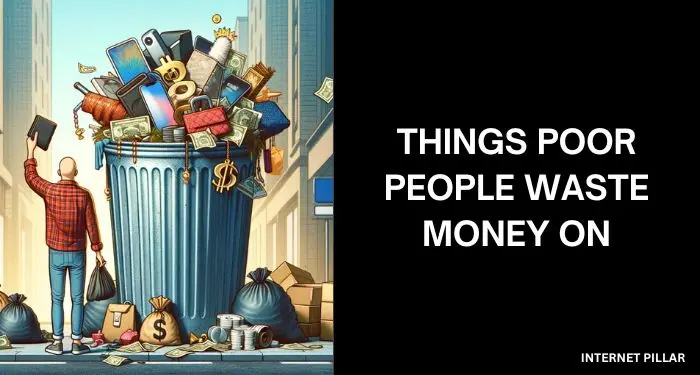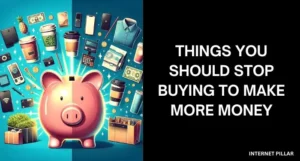Understanding how different income groups spend money can teach us a lot about managing finances.
People’s spending habits vary, but there are common trends among the poor, middle class and rich.
This article aims to highlight spending mistakes that might be holding you back financially.
It is a sensitive subject, but the intention is to help you understand that – “where your money is really going?”

As you read, consider if you might be making similar spending errors.
Let’s get started.
17 Things Poor People Waste Money On
1. High-Interest Debt
People with less money often rely on high-interest options like payday loans or expensive credit cards.
This can trap them in a tough-to-break debt cycle, unlike the more careful borrowing of richer folks.

2. Fast Fashion and Cheap Products
Those on a tight budget may buy low-cost, fast fashion or cheap items.
Though they seem wallet-friendly at first, they wear out quickly, costing more in the long run.
In contrast, wealthier buyers prefer durable, quality goods that are more economical over time.
3. Eating Out
Lower-income folks might spend more on fast food or ready meals due to time limits or lack of kitchen access.
Wealthier people, on the other hand, often save money by cooking at home.
4. Gambling
Lotteries and gambling are more common among those with less money, seen as a quick financial fix but usually leading to losses.

5. Unnecessary Warranties and Insurance
People with less might buy unnecessary extended warranties and insurance, which often aren’t worth the cost.
Wealthier individuals usually skip these unless there’s clear value.
6. Impulse Buying
Think twice before buying non-essentials like numerous phone cases or seldom-used kitchen gadgets.
Recognizing the difference between need and want can majorly impact your financial control.
7. Designer Fashion
Lower-income groups sometimes splurge on designer clothes to boost their social status.
However, why spend a lot on a single designer item when you can get more for the same amount elsewhere?
It is okay to treat yourself, but be mindful that sometimes the only difference is the brand name.

8. Luxury Travel
Enjoying a nice vacation is great, but overspending on luxury resorts isn’t wise.
There are many affordable, lovely places to stay without breaking the bank.
9. Harmful Substances
Turning to alcohol, cigarettes or drugs during tough times only worsens problems.
Opting for healthier choices like water, coffee and vegetables can help in getting back on track.
10. Unused Service Subscriptions
Avoid paying for services or subscriptions you don’t actively use.
For example, a magazine subscription that goes unread is a waste of money.
11. Latest Tech
Spending excessively on the latest gadgets isn’t wise, especially when finances are tight.
Consider the product’s life cycle and care for your belongings to extend their usage, saving money in the long run.

12. Credit Card Dependence
Credit cards can be useful but risky due to high interest rates.
It is important to manage their use carefully to avoid accumulating debt that’s hard to pay off.
13. Spending on Beauty
The desire to appear attractive can lead to unnecessary spending on beauty treatments and products.
However, true beauty doesn’t require constant salon visits or expensive makeup.
14. Hiring Personal Trainers
While personal trainers can be beneficial, they’re not essential for everyone.
Fitness goals can often be achieved through self-discipline and a basic workout routine.
15. Spending on Spiritual Items
While it’s okay to have beliefs, spending excessively on spiritual items or good luck charms without considering your budget can lead to financial strain.

16. Investing in Quick-Fix Fitness and Diets
Miracle diets and fitness gadgets are rarely as effective as they claim.
A focus on healthy eating and regular exercise is a more reliable and budget-friendly approach to weight loss.
17. Bank Fees
Bank fees, especially overdraft charges, can add up quickly, consuming a significant portion of your finances.
It is important to manage your account carefully to avoid these costs.
So these were some of the things poor people waste money on.



